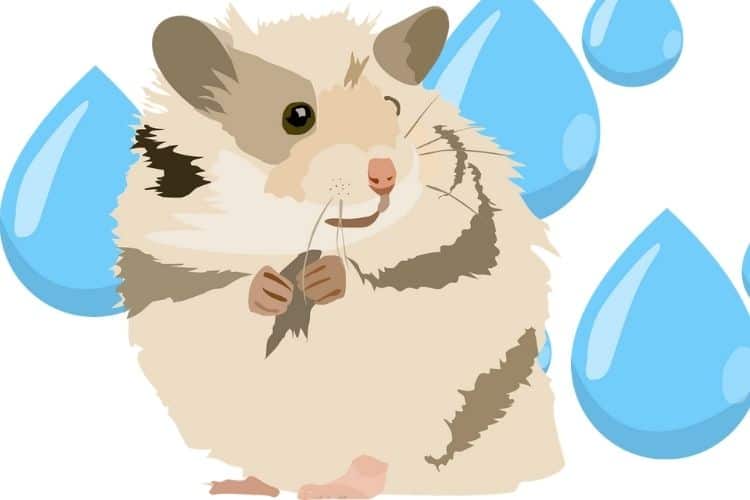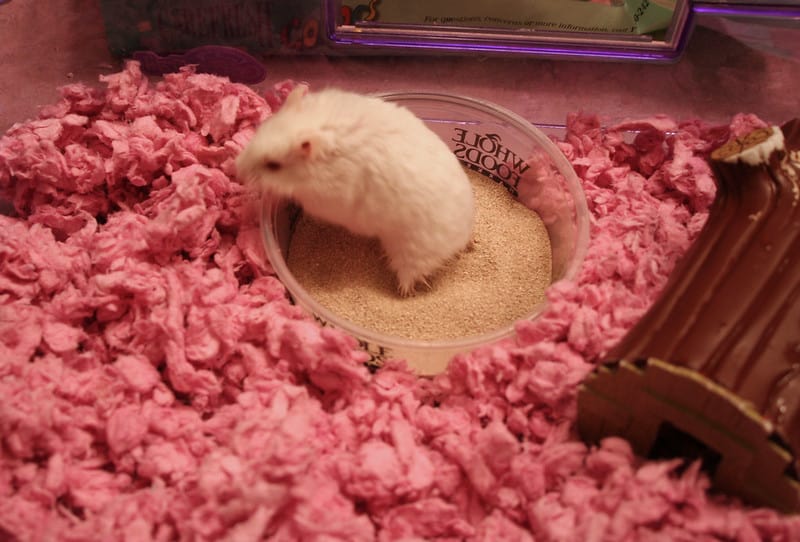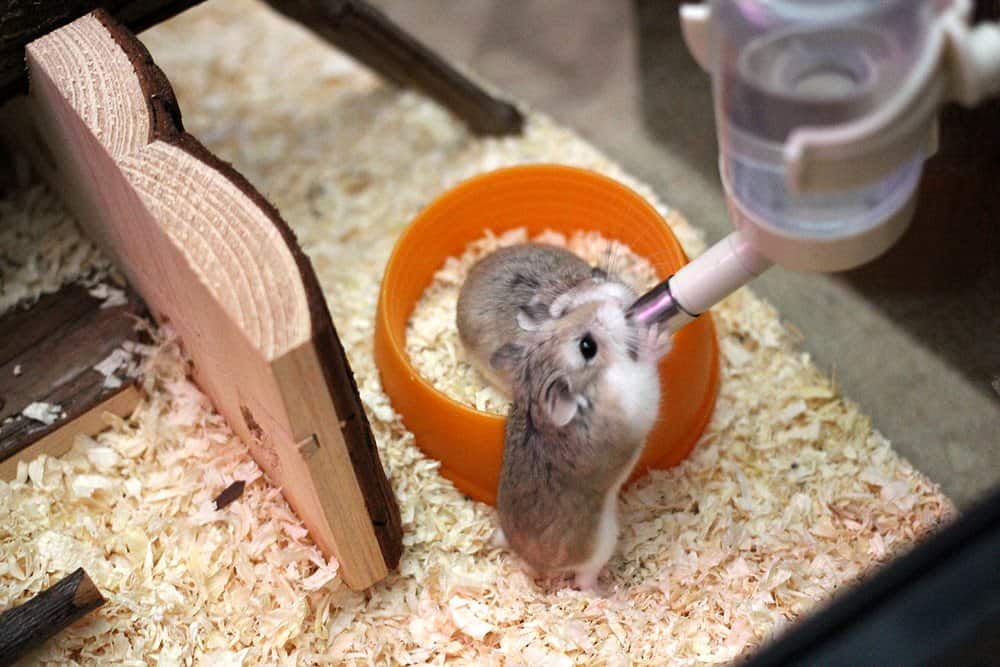Owning a hamster as a pet is a rewarding and fun experience. While taking care of one of these little furballs is generally quite easy, there are some things that are important to know. One of these things that is crucial to know is whether hamsters can swim, or if they can even get wet in the first place. As an extension to that, it’s also important to know whether they should take a bath.
To answer all water-related hamster questions, we’ve created this guide that’ll teach you everything you need to know when it comes to hamsters and water. Let’s dive in, shall we?
Can hamsters get wet? 💧

The first thing we should establish is whether hamsters can get wet. Unfortunately, the answer to the question is a resounding NO. You should never get your hamster wet.
There are two reasons why hamsters can not get wet. First, hamsters can not stand the sudden change in body temperature that occurs when they get wet, this can cause hypothermia and even result in them going into hibernation. Second, hamsters have important natural oils in their fur that gets washed off when they get wet. Lastly, getting wet causes a large amount of stress to your hamster. Let’s take a closer look at each of these reasons to discover fully why these little rodents should never get wet.
Temperature
Hamsters are very sensitive to changes in temperature. If they get wet, it’s very easy for them to become too cold and go into a state of torpor (hibernation). To make matters worse, hamsters have fur that is designed to keep them warm. They have short, wooly fur that is very good at insulating their body and keeping them warm. However, when they get wet, the opposite happens, the cold water keeps them cold, even in a warm room. This is not good for your hamster and should be avoided at all costs.
Oils in their fur
When hamsters groom themselves they put many oils in their coat that keep it clean and healthy. By getting them wet, you’re removing these important oils. As such, it’s detrimental rather than beneficial to their cleanliness when you get them wet.
Stress
Getting wet also causes undue stress for your hamster. Hamsters are already quite stressed little animals because they’re prey animals. Getting wet only makes matters worse and can cause a lot of stress for them. Stress is not good for any animal, including hamsters, and should always be kept to a minimum. As a result, it’s best to keep them dry at all times.
Do hamsters need baths? 🛁
No, hamsters do not need baths. Not only do they not need them, but they don’t want them and cannot have them either.
Hamsters spend a large part of their day cleaning themselves, it’s one of the reasons why they do not smell, even though they never take a bath. Because of that, it’s very unnecessary to give them a bath.
In addition, we’ve already established that getting your hamster wet is bad for them because it can result in hypothermia and gets rid of important oils in their fur. Since baths are made of water, it makes sense why they should not take them.
However, if you do want your hamster to take a bath, sand baths are a good option. You can put a sand bath in their cage which will allow them to clean themselves without having to use water. Most hamster breeds, especially the dwarfs, really enjoy having access to a sand bath because this is what they use in nature to keep themselves clean.

Cleaning a dirty hamster
If your hamster has gotten something stuck on its coat (this can happen quite often with long-haired hamsters) or has simply gotten dirty you might need to clean them off a little bit. However, since they can not take a bath, you might wonder how else you’re supposed to clean them. Luckily, it’s quite easy.
To clean a dirty hamster without having to submerge it in water, simply use pet-friendly wipes or a warm, damp washcloth.
In extreme cases, you might have to carefully groom them by cutting off a bit of their fur.
Can hamsters swim? 🏊🏽
Studies have shown that hamsters are technically capable of swimming. That is to say that if they fall in the water they won’t drown immediately. However, they’re not very good swimmers and because getting wet is bad for them they do not enjoy swimming either, nor is it something that you should let them do. They’re capable of swimming short distances to get themselves back to land, but that’s about it.
You should never put your hamster in a deep body of water just to let them swim for fun. They will not have a good time. It will be highly stressful and they might even die due to drowning or hypothermia.
You might have seen videos on YouTube where hamsters do swim. These videos exist, and it does show that little rodents are capable of swimming, but it’s very cruel to do this.
As you might notice in these videos, the hamsters desperately try to swim to the edges of the pool, bowl, or bathtub. This clearly shows that they want to get out. The people who make these videos are either very uninformed on how to properly care for a hamster or will simply do anything to get views. Do not follow in their footsteps, treat your hamster with the love and respect it deserves!
How to prevent your hamster from getting wet
By now, you should be convinced that getting your hamster wet is a bad idea and you should want to prevent them from getting wet as much as possible. Luckily, keeping them dry is quite simple.
First, make sure that you use a water bottle instead of a water bowl. Hamsters are relatively smart animals, but accidents happen and they can sometimes fall into their water bowl. If this happens when you’re not around and they get wet it can have pretty bad consequences. Water bottles help to avoid this issue since they’re not an open body of water.

Secondly, make sure that you either supervise children when they are handling their hamsters or that you properly inform them of the dangers of getting them wet. Make sure that they really understand that hamsters have to stay dry and that getting wet is bad for them. Children are inquisitive in nature and might be tempted to figure out for themselves if their friendly pet can swim or not. Stay one step ahead and inform your child of the dangers so that they won’t try to find out for themselves if hamsters can get wet, only to realize the truth once it’s too late.
Thirdly, you should avoid too much humidity. Hamsters live in arid, dry places without a lot of humidity. Some people have homes that are very humid. The humidity can get so high that it can even cause condensation which can result in them getting wet. If the humidity is too high, it might be wise to get a dehumidifier.
What to do if your hamster gets wet
If your hamster does get wet accidentally it’s very important that you dry it off and keep it warm as soon as possible. Follow these steps if you’ve accidentally gotten your hamster wet:
- Move the hamster to a warm room. This is to ensure that the ambient temperature is warm enough to warm them up
- Remove most of the cold water by dabbing their fur with paper towels. Do not use toilet paper because it’s might get stuck in your hamster’s coat and is not absorbent enough.
- Dry them with a regular towel. Once most of the water is gone you can dry them off completely with a regular bath towel.
- Put them back in their cage. Make sure that your hamster is completely dry and warm before you put it back in its cage. Also, ensure that they have plenty of bedding in their cage so that they can create a warm, cozy nest to stay warm.
After your hamster has gotten wet, it’s a good idea to keep a closer eye on it for a while. If you notice that it shows symptoms of getting sick you should take it to the vet for a check-up. Symptoms to look out for are a runny nose, runny eyes, and sneezing.
Final words
Hamsters are native to some of the driest regions on earth such as deserts and steppes. As such, they’re not in contact with large bodies of water very frequently. Because of that, it makes a lot of sense why they do not deal well with getting wet. They do not like the water and although they’re capable of swimming, it’s definitely not something that they enjoy or that you should let them do.
Getting wet can have disastrous consequences for a hamster. Not only is it very stressful for them, but it can even lead to hypothermia, hibernation, or in the worst cases they can drown and die.
Keeping your hamster far away from open bodies of water is crucial in keeping them safe and happy. You don’t have to worry about them getting dirty without taking baths, they’re perfectly capable of keeping themselves clean, and if you want to do more to help them out, you can always buy them a sandbath. Your hamster will appreciate it!
- How Long Do American Eskimo Dogs Live? Important Factors and Care Tips - September 29, 2023
- Do American Bulldogs Need Grooming? Essential Tips and Care Guidelines - September 29, 2023
- Do Bengal Cats Enjoy Playing? Essential Tips for Keeping Them Active - September 29, 2023